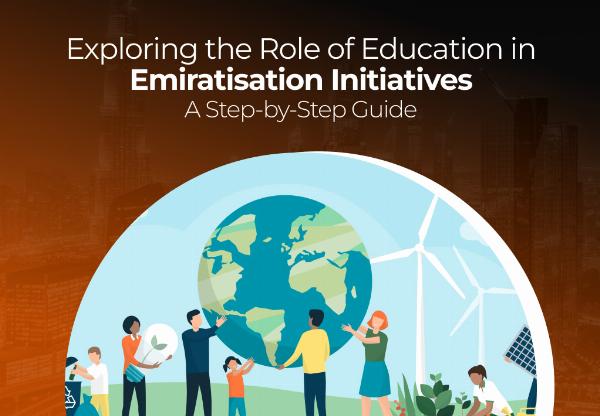The Impact of Emiratisation on the UAE Job Market

Strong 8k brings an ultra-HD IPTV experience to your living room and your pocket.
Emiratisation, a strategic initiative by the UAE government, aims to increase the participation of Emirati nationals in the country's workforce. This policy seeks to address the employment challenges faced by UAE citizens by ensuring they have ample opportunities in both public and private sectors. Emiratisation, also known as Tawteen, has profound implications for the UAE job market, impacting everything from recruitment practices to the broader economic landscape. This article explores the various dimensions of Emiratisation in the UAE, its impact on the job market, and how it shapes the future of employment in the region.
Understanding Emiratisation
What is Emiratisation?
Emiratisation refers to the national policy designed to integrate more Emiratis into the workforce. Initiated by the UAE government, this policy mandates certain sectors and companies to prioritize hiring Emirati nationals. The goal is to reduce dependency on expatriate labor, which has long dominated the UAE job market, and to ensure that Emiratis are well-represented in various industries.
Objectives of Emiratisation
The primary objectives of Emiratisation include:
Increasing Employment for Nationals: Ensuring that Emirati citizens have access to quality job opportunities.
Economic Diversification: Reducing reliance on the oil sector by promoting employment in other industries.
Skill Development: Enhancing the skill set of the Emirati workforce through training and development programs.
Sustainable Growth: Creating a balanced and sustainable economic environment by integrating more nationals into the labor market.
The Role of Emiratisation in the UAE Job Market
Impact on Recruitment Practices
Emiratisation has significantly altered recruitment practices within the UAE. Companies are now more inclined to hire Emiratis to comply with government regulations and benefit from incentives offered for meeting Emiratisation targets. This has led to the rise of Emiratisation recruitment agencies that specialize in sourcing and placing Emirati talent in suitable roles. These agencies play a crucial role in bridging the gap between employers and potential Emirati employees.
Staff Outsourcing and Emiratisation
Staff outsourcing in the UAE has also evolved in response to Emiratisation. Many companies utilize staff outsourcing services to meet their Emiratisation quotas. This approach allows businesses to hire Emirati employees on a temporary or project basis, providing flexibility while still adhering to regulations. Staff outsourcing has thus become a strategic tool for companies aiming to balance their workforce and meet Emiratisation requirements.
Economic Implications of Emiratisation
Boosting Local Employment
One of the most direct impacts of Emiratisation is the increase in employment opportunities for UAE nationals. By prioritizing the hiring of Emiratis, the policy helps reduce the unemployment rate among locals and ensures that a significant portion of the workforce is composed of citizens. This not only benefits individuals but also strengthens the national economy by keeping wealth within the country.
Enhancing Workforce Skills
Emiratisation initiatives often include training and development programs designed to equip Emiratis with the necessary skills to excel in their roles. These programs ensure that nationals are not only employed but also capable of contributing effectively to their organizations. Over time, this leads to a more skilled and competent workforce, enhancing overall productivity and innovation within the UAE.
Encouraging Economic Diversification
By promoting employment in various sectors beyond the traditional oil industry, Emiratisation supports the UAE's efforts toward economic diversification. With more Emiratis working in sectors like finance, healthcare, technology, and tourism, the country can reduce its dependency on oil revenues and build a more resilient and diversified economy.
Challenges and Solutions in Implementing Emiratisation
Challenges in Emiratisation
Despite its benefits, Emiratisation faces several challenges:
Cultural Barriers: There are cultural differences between expatriates and Emiratis that can affect workplace dynamics.
Skill Gaps: Some industries face a shortage of Emirati candidates with the necessary skills and experience.
Employer Resistance: Some employers are hesitant to hire Emiratis due to perceived higher costs or concerns about productivity.
Solutions and Strategies
To overcome these challenges, several strategies can be implemented:
Enhanced Training Programs: Providing comprehensive training to Emiratis to bridge skill gaps and ensure they are job-ready.
Incentives for Employers: Offering financial incentives and support to companies that successfully integrate Emiratis into their workforce.
Cultural Integration Initiatives: Promoting cultural understanding and integration within workplaces to foster a more inclusive environment.
Future Prospects of Emiratisation
Technological Advancements
The future of Emiratisation will likely be influenced by technological advancements. As the UAE continues to invest in technology and innovation, there will be a growing demand for Emiratis with skills in these areas. Initiatives focused on STEM (Science, Technology, Engineering, and Mathematics) education and training will be crucial in preparing the Emirati workforce for future opportunities.
Government Policies and Support
Ongoing government support and policies will play a vital role in the success of Emiratisation. Continued investment in education, training, and job creation programs will ensure that Emiratis are well-prepared to meet the demands of the evolving job market. Additionally, policies that encourage entrepreneurship among Emiratis can further boost employment and economic growth.
Global Competitiveness
As Emiratisation progresses, the UAE is poised to enhance its global competitiveness. A well-trained and diversified workforce will attract more international businesses to the region, further stimulating economic growth. By successfully integrating Emiratis into various sectors, the UAE can position itself as a leading global hub for business and innovation.
FAQs
1. What is the main goal of Emiratisation?
The main goal of Emiratisation is to increase the participation of Emirati nationals in the UAE workforce. This policy aims to provide more job opportunities for Emiratis, reduce reliance on expatriate labor, and ensure sustainable economic growth.
2. How does staff outsourcing support Emiratisation?
Staff outsourcing supports Emiratisation by allowing companies to hire Emirati employees on a temporary or project basis. This approach provides flexibility for businesses to meet their Emiratisation quotas while ensuring that nationals are integrated into the workforce.
3. What challenges does Emiratisation face, and how can they be addressed?
Emiratisation faces challenges such as cultural barriers, skill gaps, and employer resistance. These challenges can be addressed through enhanced training programs, financial incentives for employers, and cultural integration initiatives to create a more inclusive workplace environment.
Conclusion
Emiratisation is a transformative policy that significantly impacts the UAE job market. By prioritizing the employment of Emirati nationals, the UAE is taking important steps toward economic diversification, skill enhancement, and sustainable growth. While there are challenges to overcome, the continued efforts of the government, employers, and educational institutions will ensure that Emiratisation remains a cornerstone of the UAE's economic strategy. As the nation moves forward, Emiratisation will play a crucial role in shaping a more balanced and resilient economy, benefiting both Emiratis and the broader society.
Note: IndiBlogHub features both user-submitted and editorial content. We do not verify third-party contributions. Read our Disclaimer and Privacy Policyfor details.


